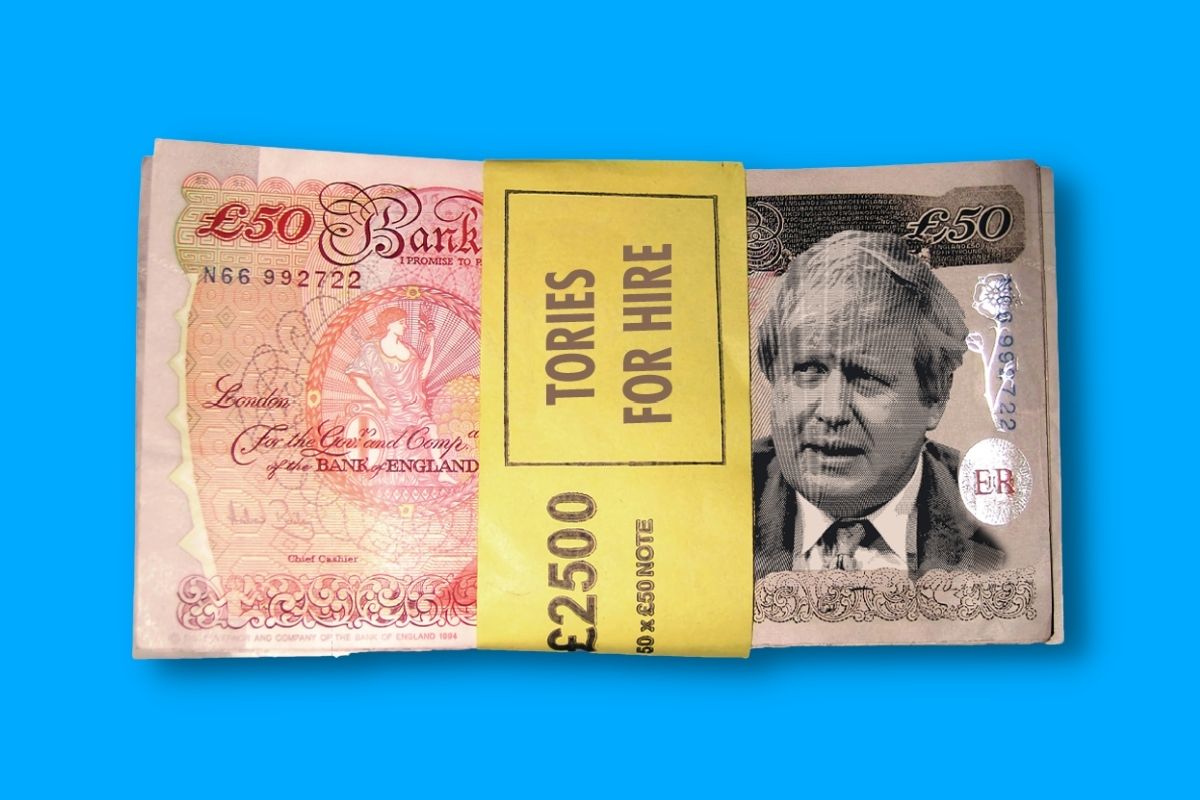A recent exposé by the Financial Times has once again unearthed the sordid practices of corporate lobbying, cronyism, and ‘cash for access’ that takes place between Tory donors and leading Conservative figures. Capitalism is corruption.
Recent revelations have shone new light on the murky world of Tory Party funding, once again exposing the huge influence that the rich and powerful have over the higher echelons of government.
An investigation by the Financial Times has revealed the existence of a secretive club of ‘elite’ donors, run by a character called Ben Elliot.
Elliot, the nephew of the Duchess of Cornwall, is also a long-standing chum of Boris Johnson (of course). Until now, he has been best known for running an exclusive company called Quintessentially, which aims to provide a ‘luxury lifestyle management service’.
For £15,000 a year, Quintessentially’s customers can get such treats as dinner with Prince Charles and other establishment types. No wonder Elliot has become known as ‘Mr Access All Areas’.
Now it seems that Elliot has moved into the lucrative field of Tory fundraising: a world where a rich few seem quite happy to part with huge sums of money, whilst complaining about the costs of public services and workers’ wages.
Exclusive clubs
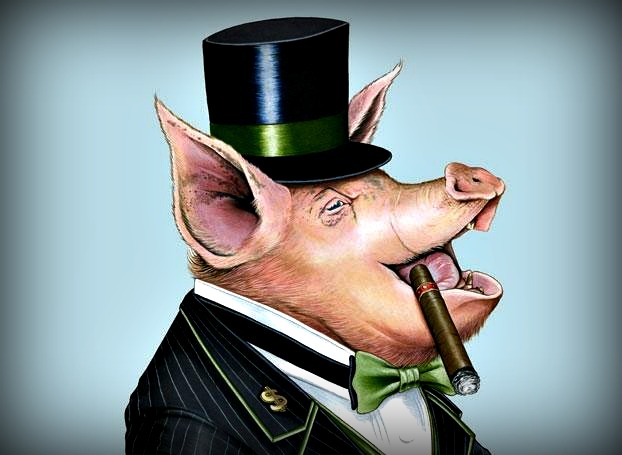 This Arthur Daley of the Tory world was pushed centre stage by Johnson as soon as he became PM in July 2019.
This Arthur Daley of the Tory world was pushed centre stage by Johnson as soon as he became PM in July 2019.
Elliot quickly showed a talent for filling up the party’s diminished coffers, raising £37.4 million in the year leading up to the last general election. Most of this money came from a few super-rich individuals, who were targeted and buttered-up by Elliot and his team.
Although the Tories like to pretend that they are just funded via small donations from local supporters and party groups, the reality is that most of their funds come from a small and select number of wealthy backers.
A number of shady conduits are used to funnel money into the party: from unincorporated associations, to a variety of so-called clubs.
Membership of these clubs can vary from a miserly £300 a year, which gets you very little; up to £50,000 a year, which clearly must get you a bit more than the odd drink with an MP.
Those in the Leaders Group, for example, enjoy monthly lunches with ministers. No doubt they are not just there for the food, but expect rather more.
Cash for access
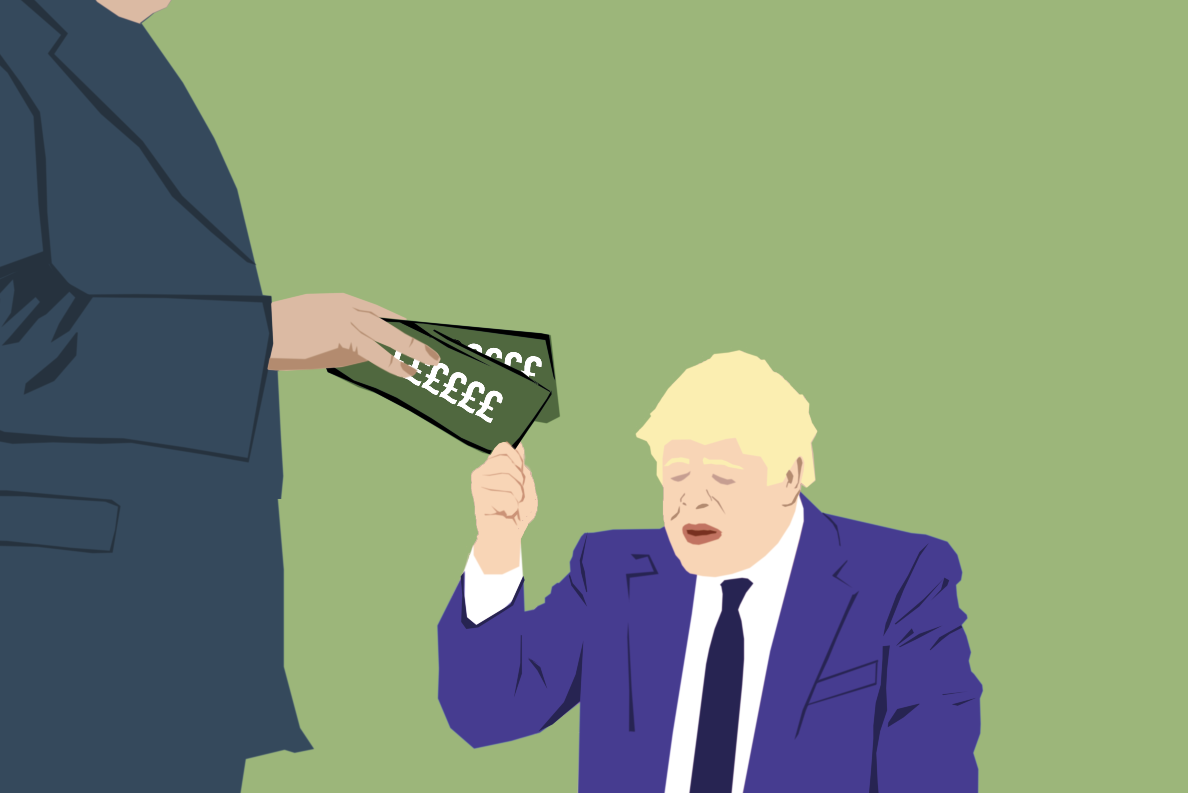 Until now, little has been known about a ‘club’ even more exclusive than the Leaders Group: the Advisory Board.
Until now, little has been known about a ‘club’ even more exclusive than the Leaders Group: the Advisory Board.
Only for the mega rich, this group requires much larger sums to get you through the door. Both Boris Johnson and Rishi Sunak have been present at their meetings.
According to businessman Mohamed Amersi, as quoted in the FT, it is “like the very elite Quintessentially clients membership: one needs to cough up £250,000 per annum or be a friend of Ben”. A friend indeed is a friend with greed.
The Tories have gone to great lengths to hide the existence of this club. Indeed, many party insiders claim to never have even heard of it.
Yet it is clear that membership offers unparalleled contact to those at the very top of government.
The question many will be asking is: what do these well-heeled types get in return for their investment?
The claim that this club exists just to allow for the occasional meet-up with Johnson and get ‘an update on the political landscape’ sounds dubious, to say the least. The super-rich don’t give a penny unless they expect something concrete in return.
Tory chumocracy
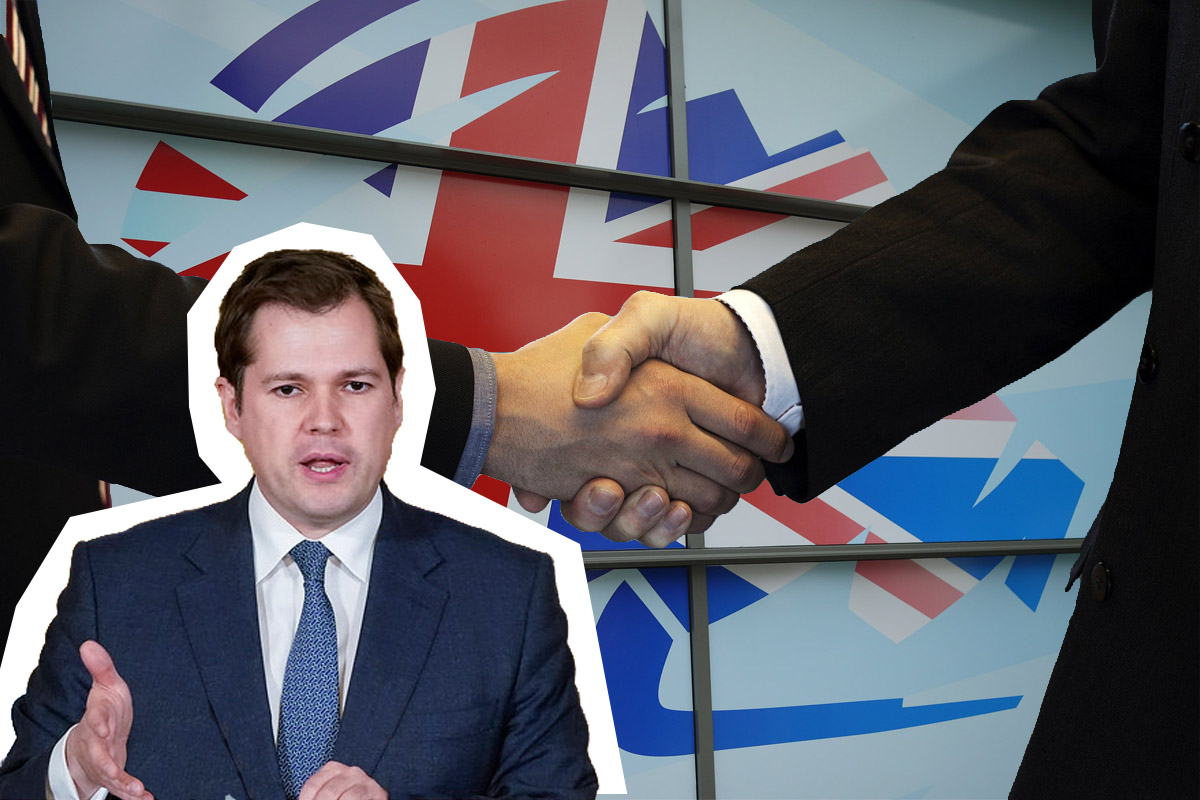 If this was just a one-off, many people might not pay much attention to these latest revelations. Yet the exposure of this secretive club is just one of a whole swarm of sordid scandals to have been unearthed in recent months and years.
If this was just a one-off, many people might not pay much attention to these latest revelations. Yet the exposure of this secretive club is just one of a whole swarm of sordid scandals to have been unearthed in recent months and years.
Earlier this year, for example, there was the mysterious ‘cash for curtains’ saga over who was funding the PM’s hugely-expensive refurbishment of Number 10.
On top of this was the cronyism between senior Tories, their rich mates, and a whole raft of lucrative COVID-related government contracts, worth billions collectively.
For example, former health minister Matt Hancock had shares in a company owned by his sister, which somehow got a juicy contract with NHS Wales.
And of course there were the huge handouts awarded to big business as part of the disastrous test-and-trace system, as well as for equipment that turned out to be useless: face masks that were unfit for NHS staff to use; testing kits that were unsafe, and so on.
There was also the news that the Prime Minister had texted Sir James Dyson to tell him that he would ‘fix’ a tax problem for him. And remember also the various links between the Jockey Club and the Tories, which helped ensure that the Cheltenham Festival went ahead at the time of the first wave.
We also shouldn’t forget the ongoing scandal concerning former PM David Cameron, and his connections to Greensill Capital. This again exposed the rotten world of corporate lobbying – part of the ‘revolving door’ that seems to operate freely between the state and big business.
And finally we had the Jenrick affair, where approvals for planning permission were streamlined for Tory donors, despite official concerns.
In other words, this government of sleaze has been rocked by one scandal after another. Capitalism is corruption.
Political investment
 All manner of murky details have emerged in relation to the Advisory Board revelations.
All manner of murky details have emerged in relation to the Advisory Board revelations.
Some have drawn attention to the issue of where some of the donations into the Tory Party’s bank accounts have actually come from.
Questions have also been raised about whether the above-mentioned Mohamed Amersi benefited from receiving £4 million from a company with close links to the Putin regime. Amersi claims that there is no link between this cash and his £750,000 political ‘investment’ in the Tories. Pure coincidence perhaps?
In fact, it is estimated that £2 million pounds have been donated to the party from Russian sources just since Johnson became PM. Indeed, over the years, one Russian donor, banker Lubov Chernukhin, has coughed up £1.7 million – a largesse that has given her considerable access to successive Tory leaders.
Of course, it doesn’t stop there. Not only the Tories, but others at Westminster, have also benefited from big business’ contributions.
During the Blair years, many rich donors came forward to help promote New Labour. Indian billionaire steel magnate Lakshmi Mittal, for example, gave £4 million to the Labour Party between 2005 and 2010. He has since directed his cheque book towards the Tories.
We also saw large sums being thrown at Sir Keir Starmer’s Labour leadership campaign at the start of last year.
In fact, a trawl through the register of MPs’ interests reveals an incredible world of gifts, fees, and regular ‘payments’ from all manner of odd companies, front organisations, and individuals, who seem to have unlimited funds sitting at their disposal.
Some of the income recorded is for legitimate work – MPs working as nurses and doctors during the pandemic, for example. But much will raise eyebrows, to say the least.
For example, between resigning as chancellor in early 2020 and coming back into the Tory Cabinet more recently, Sajid Javid was picking up £150,000 per year from banking giant JP Morgan for 96 hours ‘work’ a year. This was alongside a similar figure as an advisor to Californian software firm C3 AI.
We should also note the vast number of All-Members Parliamentary Groups (AMPGs) that exist, covering just about every country, interest, or issue – many of which receive funding from outside bodies, allowing them to send MPs off on all manner of all-expenses-paid trips.
It was also recently noted that an awful lot of MPs benefited from donated tickets – and associated ‘hospitality’, of course – to events such as the Grand Prix, Wimbledon, and Euro 2020 games. Some of these were from gambling firms, which rely on organised sports as a major source of income.
In fact, it looks like Westminster is just one huge bung-a-thon – one that clearly involves a lot of money and goodies changing hands.
Capitalism is corruption
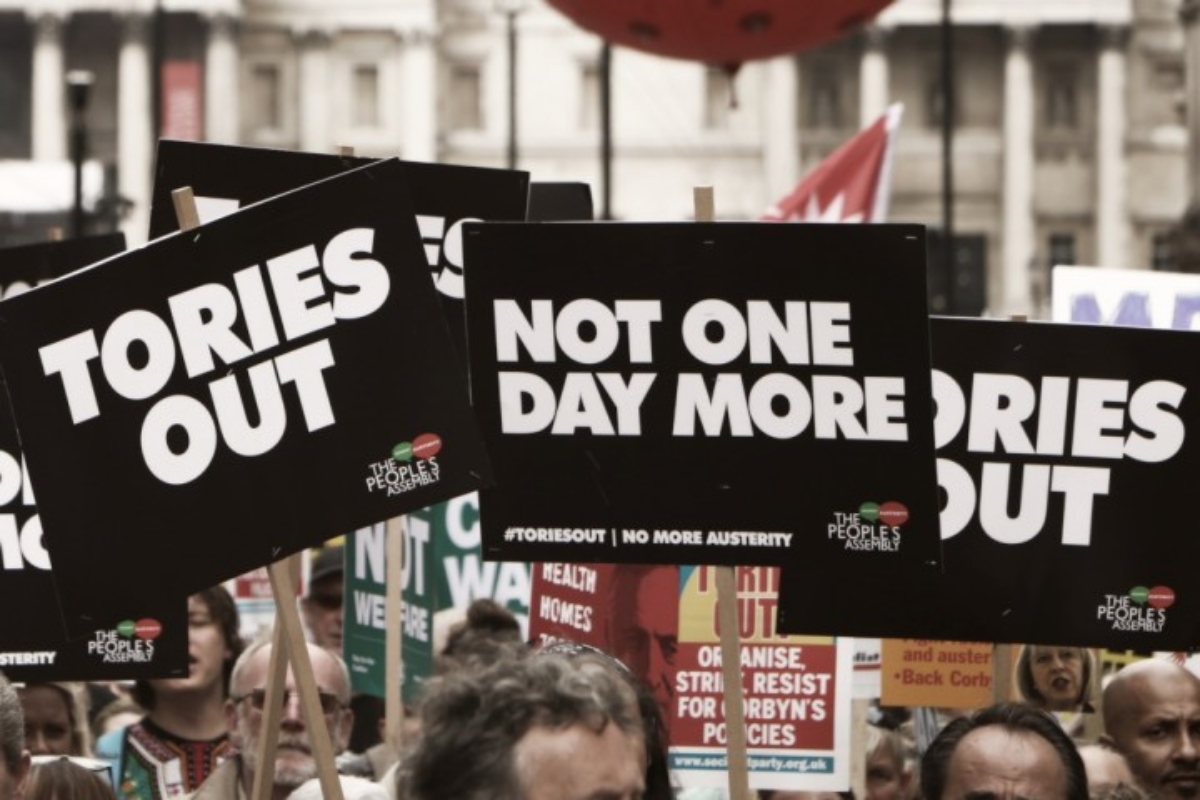 Many will be looking at all this and asking: who do our elected representatives actually listen to – the millions or the millionaires?
Many will be looking at all this and asking: who do our elected representatives actually listen to – the millions or the millionaires?
For the overwhelming majority of MPs, the answer is all too clear. Shamefully, we must also include a large part of the Parliamentary Labour Party in this. No wonder they were so hostile to Corbyn and his left-wing manifesto.
On both sides of the aisle, we see nothing but greed and self-interest, in defence of the establishment, big business, and the rule of capital.
This is not just a case of a ‘few rotten apples’; of a couple of accidental flaws in our otherwise fully-functioning ‘democratic’ system.
This is the system operating as it always has: a setup that exists so that the ruling class, tied together by a thousand threads, can maintain their privileges and power, under the illusion of parliamentary democracy.
What the capitalists want, they buy: ministers, officials, judges, MPs, the lot – all in their pockets.
Johnson’s money grab via the likes of Elliot is just par for the course. What we have here, under capitalism, is nothing short of legalised bribery and corruption. And for every scandal that comes to light, a hundred more stay hidden from the view of ordinary people.
Nevertheless, the Advisory Board revelations just confirm what we already knew: that the Tory Party and its leading representatives are firmly in the pockets of rich vested interests.
Those who claim to represent the labour movement and working-class communities must not be a part of this charade. They must be accountable to workers, not to the bankers and bosses.
For the labour movement, the demand must be clear: for a workers’ MP on a worker’s wage; for class fighters, not careerists. We need open selection of Labour MPs, so we can elect socialists, not socialites.
The Tory Party and the establishment are hopelessly corrupt. They will only ever act in the interests of the few.
The road being taken by Starmer and the Labour right wing is aimed at mimicking this. This needs to change.
Minor reforms cannot tackle the corruption that lies at the heart of this whole rotten system. Only the struggle for socialism can end this endemic scourge.

